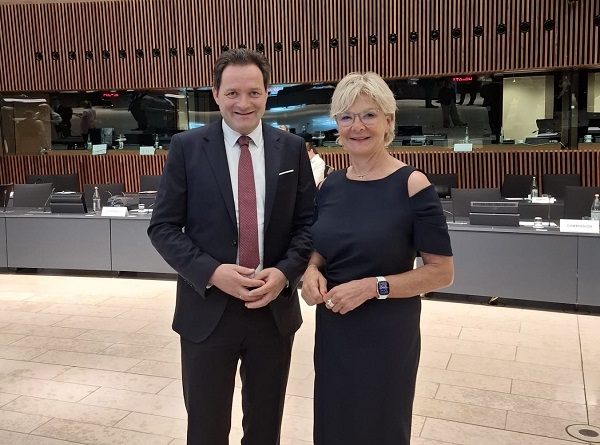 (L-R) Norbert Totschnig, Austria's Federal Minister of Agriculture and Forestry; Martine Hansen, Luxembourg's Minister of Agriculture, Food and Viticulture;
Credit: MA
(L-R) Norbert Totschnig, Austria's Federal Minister of Agriculture and Forestry; Martine Hansen, Luxembourg's Minister of Agriculture, Food and Viticulture;
Credit: MA
On Monday 23 and Tuesday 24 June 2025, Luxembourg hosted the European Union (EU) Agriculture and Fisheries Council.
As reported by Luxembourg's Ministry of Agriculture, Food and Viticulture, 20 agriculture ministers expressed their commitment during the Council to a strong, autonomous and strategic Common Agricultural Policy (CAP), which is essential to ensure the EU's food sovereignty.
Luxembourg's Minister of Agriculture, Food and Viticulture, Martine Hansen, reiterated that political decisions on the CAP must remain in the hands of the agriculture ministers.
The minister welcomed the first simplification package presented by the European Commission, while emphasising the need to avoid any additional administrative burden for farms. She welcomed the proposal for more flexible application of cross-compliance for organic farms, but requested that this simplification also be applied to farms (partially) converting to organic farming.
Minister Hansen also argued that the recent EU Deforestation Regulation (EUDR) is an example of a regulation that risks generating a disproportionate bureaucratic burden for farms located in countries where deforestation is not a problem.
Regarding the forest monitoring framework, the Polish Minister for Agriculture and Rural Development, Czesław Siekierski, stated at the meeting: "Forests are the green lungs of our planet - essential for our climate, our biodiversity and our sustainable growth and future. With the new forest monitoring framework, we are providing forest managers and owners with the tools they need to protect and manage this precious natural resource responsibly, balancing conservation and production goals, while avoiding unnecessary bureaucracy".
Luxembourg's Agriculture Minister expressed support for the initiative to protect traditional designations for foods of animal origin. She stressed the need to distinguish between products of animal origin and plant-based alternatives to ensure clear and transparent information for consumers. The minister called for the use of precise definitions on the labelling of these products.
Regarding the alignment of maximum residue levels (MRLs) for pesticides applied to imports, Minister Hansen insisted that products from third countries fully comply with European standards - seen as an essential condition for preserving the competitiveness of EU farmers and ensuring fair competition.
Moreover, Minister Hansen supported the Polish Presidency's proposal to establish a list of general principles that should form the basis of all trade negotiations, such as impact studies that take into account environmental, social and animal welfare aspects, binding and transparent provisions for compliance with standards, and the application of the principle of reciprocity.








